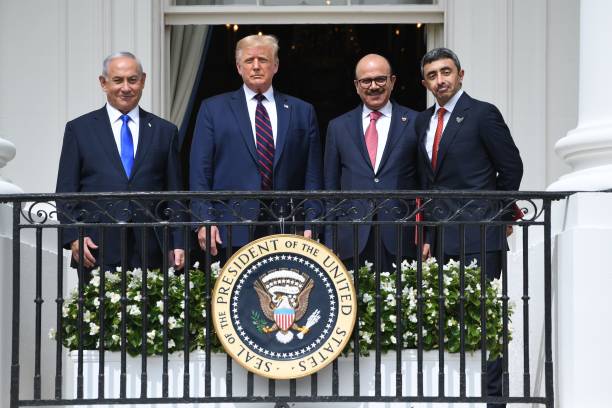
WASHINGTON — The U.S. House of Representatives has given initial approval to a proposal to establish an FDA office in the countries signatory to the historic Abraham Accords. The initiative is part of a watershed plan to further strengthen regional ties and reduce America’s dependence on Chinese pharmaceutical supplies.
The bipartisan bill, which has been on the drawing board over the last year, amended a direct reference to Israel and referred to a bureau in the “Abraham Accord region” amid ongoing vacillation by the Israeli Health Ministry regarding whether to sign on with the project.
The plan comes at a time of ever-improving relations between Israel and four Arab countries that made peace as part of the landmark 2020 Abraham Accords, as well as concomitant pharmaceutical shortages in the United States, which is heavily reliant on China for its healthcare needs.
“The consequence of not fortifying and diversifying America’s medical and pharmaceutical supply chains is now a matter of national security. Drug shortages have had cascading effects on patient treatment, hospitals, and our military troops. We need to stop the bleeding that is our over-reliance on unstable sources for medical products at all stages of the supply chain,” said Reps. Randy Weber (R-Texas), Juan Vargas (D-Calif.), Rick Allen (R-Ga.), and Diana Harshbarger (R-Tenn.) in a joint statement.
The markup of the bill by the House Appropriations Committee this past week marked the first major bipartisan congressional step toward reducing America’s essential medical and pharmaceutical supply chain overdependence on China amid the compounding drug shortage crisis.
Markup is the process by which a congressional committee debates, amends, and rewrites proposed legislation.

The bill is now expected to go before the full House for a vote before the August recess, and then be sent to the Senate for final approval.
The impetus for establishing an FDA bureau in the Middle East, which in years past has previously been considered in Israel alone, gathered force in the wake of the peace accords and has since gained favorable momentum among bipartisan members of Congress concerned about America’s overreliance on China.
“It is clear that there are key opportunities to set up a new staging ground for cost-effective manufacturing, and to benefit from some of the world’s cutting-edge healthcare innovations and robust biopharmaceutical industries within the region, all while strengthening the path toward lasting Middle East peace,” said Heather Johnston, founder, and CEO of the United States Israel Education Association (USIEA), an Alabama faith-based non-profit which has lobbied Congress to enact the proposal.
The move comes in a post-COVID environment in which there is a global dynamic toward diversifying pharmaceutical supply chains amid growing U.S.-China tensions on the one hand, and burgeoning relations between Israel and the United Arab Emirates on the other.

The UAE, as well as Bahrain and Morocco, have already signed on to the plan, while the Israeli Health Ministry has been more circumspect in green lighting it.
“Time is of the essence here, I hope that Israel steps up to the plate and aggressively embraces this opportunity. Inaction has consequences,” said Peter Pitts, former FDA Associate Commissioner and a Senior Fellow at USIEA to Zenger News.
“The issue is under discussion among the relevant officials in Israel and the US in order to find the best framework for cooperation between the FDA and Israel,” said The Israeli Ministry of Health in a written response.
The head of Israel’s umbrella organization for hi-tech, life science, and advanced technology has expressed enthusiastic support for an FDA office in Israel, calling it a boon for both U.S.-Israeli ties and the region.
“We greatly appreciate the bipartisan progress in Congress on the bill, and we hope that this proposal will end up including an FDA office in Israel, strengthening the hi-tech and life science industries which are the leading growth engine of the economy of Israel,” said Karin Mayer Rubinstein, CEO and president of Israel Advanced Technology Industries Association (IATI).
Both Israel and the UAE have robust pharmaceutical industries, with Israel’s cutting-edge technological advances in medicine and science being renowned worldwide
But with the U.S. legislative calendar progressing and the Arab countries already on board with the concept, the bureau may end up opening in the Gulf.
“Having a USFDA branch in Israel would be another great way of strengthening U.S.-Israel cooperation,” said Gideon Israel, president of the Jerusalem Washington Center, who was involved in previous such efforts over the last decade. “It would be a shame if an office isn’t opened [in Israel] now that there is congressional support on both sides of the aisle for such a move,” he added.
The FDA operates regional offices in China, India, Costa Rica, Chile, Mexico, and Belgium, but none in the Middle East. An office was briefly opened in Amman, Jordan, but was subsequently closed.
According to the proposal, the FDA field office envisioned would be unique in that it would not deal with selling drugs domestically—thereby adding another bureaucratic hurdle—but only with exports to the United States.
A previous bipartisan proposal back in 2019 to open an FDA field office solely in Israel, to help it advance its role in global pharmaceutical development in the pre-COVID era, never got off the ground.
Proponents of the current regional concept believe that with a changed regional and global environment this time the proposal will come to fruition as early as next year.
Produced in association with Jewish News Syndicate
Edited by Judy J. Rotich and Virginia Van Zandt







